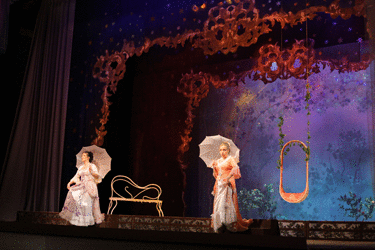La traviata (tour – Stevenage)
It’s deservedly one of Verdi’s most popular operas. “La traviata” is also probably the one with which he felt the closest emotional connexion – that much mooted but never written “Lear” excepted.

For its current UK tour, the Russian State Ballet and Opera Theatre of the Republic of Komi (in the Urals, north of Moscow) has a new production of one of Verdi's two operas of 1853 – both now established favourites.
The theatre's artistic director Boris Lagoda has staged it with costumes by Tatyana Mirova and the simplest of settings, important for a tour which seldom stays in one town for more than a couple of performances. That means, however, that the musical as well as the dramatic elements of the production have to carry additional weight.
Olga Sosnovskaya sings and acts Violetta very well and produces a fine legato lines as well as allowing the quieter passages to make their effect, though at the performance I attended the final notes of "Sempre libera" came out as something of a screech.
Her Alfredo is Chingis Ayusheev, a young tenor in whose ability to tumble in and out of passion one can thoroughly believe, though his phrasing needs to acquire a touch more subtlety. This version cuts the cavatina "O mio rimorso" after his Act Two Scene One exchange with Elena Lodigina's Annina, which is a pity as it adds a slightly different dimension to Alfredo.
Germont père has more to him than the stern moralist so concerned to avoid scandal. Andrey Kovalev brings out the harshness but never the genuine love for his two children which underpins it. Nikolai Glebov makes more of the small role of the Marquis, especially in Act Two Scene Two, than either Anatolii Izmalkov as Baron Douphol or Vladirmir Yurkovski as Alfredo's friend Gastone.
Violetta's friend and fellow courtesan Flora makes her mark in Galina Malikova's portrayal and there's a neat sketch of the caring Dr Grenvil by Alexander Zavoronkov. The chorus is a large one, though Mirova's costumes for the women did suggest the wardrobe of a touring company from the 1950s rather than the 2010s.
Lagoda pushes the symbolism of time running out for Violetta a trifle too heavily for my taste; the backcloth suggests a clock and a collection of faded and distressed dials litters the stage at two points. The orchestra under Azat Maksuov is competent, though I could have dispensed with the reprise of the Act One prelude covering the scene change between Acts One and Two.
La traviata tours nationally until 27 February.












